Midwives are companions and supporters of pregnant women and their families before, during and after birth. Throughout the course of a pregnancy, midwives make home visits, provide guidance and care, and facilitate birth preparation and capacity-building classes. They contribute to the protection of fundamental human rights by transmitting their knowledge to mothers and families. Midwifery is based on evidence-based practices and traditional knowledge, skills and techniques. It varies according to the social, cultural and natural contexts of different communities and countries, and sometimes includes knowledge of traditional medicine and of medicinal plants and herbs. Midwifery also entails specific cultural practices, vocabulary, celebrations and rituals. The related skills and knowledge have been safeguarded, developed and passed on by practising communities for generations, especially within networks of women. Traditional knowledge of midwifery is accumulated through direct experience, observation and interaction with the human body. It is transmitted through oral instruction, observation, participation and peer exchange. In many countries, the practice of midwifery also requires certification, and the related knowledge and skills are transmitted through formal education such as academic learning based on curricula, some of which align with the standards established by the International Confederation of Midwives.










